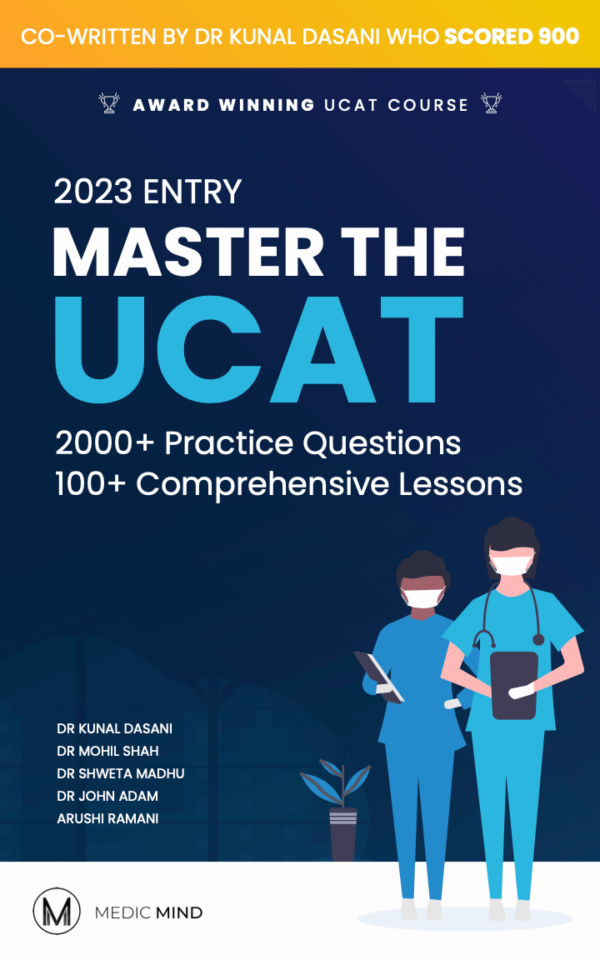Loading...


UCAT 2023 | Changes to Structure of UCAT 2023
The UCAT 2023 is undergoing a renovation from the age-old time-pressured format of the past. As always, our team at Medic Mind are committed to ensuring that you stay up-to-date on the UCAT and so, below is a deep dive into all the changes to the UCAT 2023.
Changes to Timing in the QR Section
Previously, candidates had 24 minutes to answer 36 questions in Quantitative Reasoning.
This averaged to around 40 seconds per question. However, from 2023 onwards, there will be 25 minutes to answer the same number of questions.
This will reduce the overall time pressure in both the exam and the QR section specifically.
This is one of the biggest changes to UCAT 2023

Changes to the Timing and Questions in the AR Section
In one change to 2023 UCAT, there will be 5 fewer questions in the Abstract Reasoning Section.
Consequently, the timing has been adjusted accordingly with the section lasting 1 minute lesser than in previous years.
Whilst this does not reveal any improvements in the timing of the exam, it does reduce decision fatigue due to reduced number of questions to be answered.
Boost your UCAT Score with our Expert Tutors!
Changes to the Number of Questions in the SJT
The SJT will now be comprised of 66 questions as opposed to the previous 69. However, the timing remains unchanged at a total of 26 minutes for the section.
This gives candidates an additional timing advantage.
New SJT question format
Most notably, there will be a brand new SJT question format in the UCAT 2023 onwards.
Whilst it is similar to previous SJT questions, the structure and components of the stems will vary.
The new format builds upon the popular ‘Importance’ questions in the SJT. To better understand the changes, let us first consider the original formatting of ‘Importance’ questions.
Here, candidates are asked to rate the importance of a given factor in the role that it may play in the decision making related to the situation at hand. Let us now consider how this changes in the new question format.
From now onwards, a new question type will give candidates a plethora of factors – typically 3 – and ask them to identify the most and least important of the selection as it relates to the given situation. It is likely that there will be a minimum of 2-3 questions of this style in the 2023 UCAT.
This may seem familiar; and for good reason! The new question format is an amalgamation between ‘Importance’ questions and the latest of the additions, ‘Type 3’ questions. Therefore, practicing the older formats of the SJT will only further strengthen the skills required for the newer question types. Find out more about achieving success in the SJT here.
Finally, it is important to note that no changes have been announced to the Decision Making or Verbal Reasoning sections of the UCAT 2023.
Whilst changes to the UCAT 2023 are inevitable, sustained and personalised revision will only help improve a candidate’s UCAT score. With this in mind, we strongly suggest that you prevent these changes from causing extra worry and instead, focus on practicing sample and past-paper UCAT questions, as can be found here, to improve your skills. Furthermore, our UCAT experts are available to tailor UCAT revision plans to your personal strengths and weaknesses in an effort to help you ace the latest SJT format and more! Find out more here.
Frequently Asked Question
→What is UCAT 2023
UCAT 2023 is an aptitude test used by universities in the United Kingdom, Australia, and New Zealand for admission into their medical and dental programs. It is designed to assess a range of cognitive abilities, including verbal reasoning, decision making, quantitative reasoning, and abstract reasoning.
→What are the changes to the structure of UCAT 2023?
UCAT 2023 will have a new subtest called Situational Judgement Test (SJT). This test is designed to assess an individual’s ability to make appropriate decisions in various situations. SJT will replace the Decision Making subtest, which was previously part of UCAT.
→Will there be any changes to the duration or format of UCAT 2023?
No, there will be no changes to the duration or format of UCAT 2023. The test will still consist of five subtests, including Verbal Reasoning, Quantitative Reasoning, Abstract Reasoning, Decision Making, and Situational Judgement Test.
→How will the new Situational Judgement Test (SJT) be scored?
The Situational Judgement Test (SJT) will be scored separately from the other subtests. The scores for SJT will be reported on a scale of 300-900, with a mean score of 600. The scores for the other subtests will also be reported on a scale of 300-900.
→Can I use calculators during UCAT 2023?
No, calculators are not allowed during UCAT 2023. However, the test will provide an on-screen calculator for use during the Quantitative Reasoning subtest. It is important to note that the calculator provided will be a basic one and may not have all the functions of a scientific calculator.
→What is the structure of the UCAT?
The UCAT (University Clinical Aptitude Test) is a standardized test used by universities in the United Kingdom, Australia, and New Zealand to assess the cognitive abilities of candidates applying for medical and dental programs. The UCAT consists of five subtests:
Verbal Reasoning: This subtest assesses your ability to critically evaluate written information and draw logical conclusions.
Quantitative Reasoning: This subtest assesses your ability to interpret and analyze numerical information, solve problems using mathematical concepts, and use data to make inferences.
Abstract Reasoning: This subtest assesses your ability to identify patterns and relationships between shapes and figures, and use this information to solve problems.
Decision Making: This subtest assesses your ability to analyze information, evaluate arguments, and make sound decisions.
Situational Judgement Test: This subtest assesses your ability to make appropriate decisions in various situations, based on ethical and professional considerations.
The UCAT is a computer-based test, and each subtest is timed separately. The test is designed to be challenging, with a tight time limit for each subtest, so it is important to develop effective test-taking strategies to maximize your score on the exam.
→How many times can I take UCAT 2023?
You can take UCAT 2023 once a year. If you are not satisfied with your score, you can take the test again the following year. However, it is important to note that some universities may have specific requirements for the number of times you can take the test, so it is important to check with each university before registering for the test.





Was this article helpful?
Still got a question? Leave a comment
Leave a comment